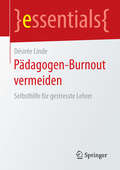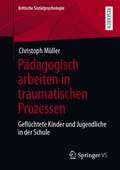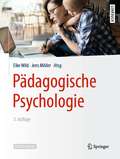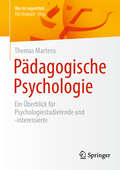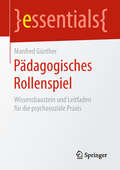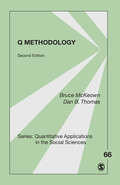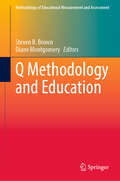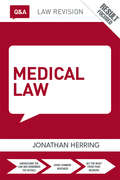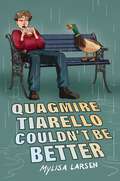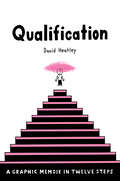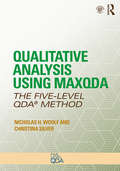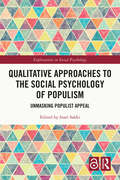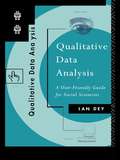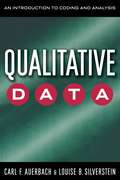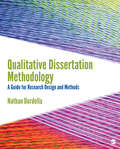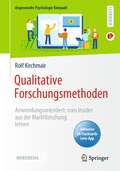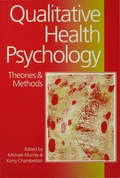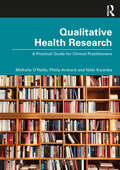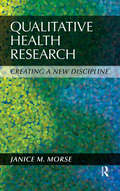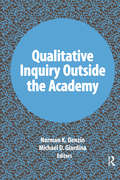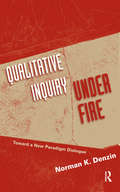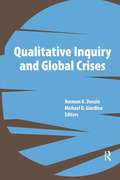- Table View
- List View
Pädagogen-Burnout vermeiden: Selbsthilfe für gestresste Lehrer (essentials)
by Désirée LindeMit diesem essential erhalten gestresste Lehrer praxiserprobte Anleitungen, um einem drohenden Burnout vorzubeugen. Ausgehend von den stresserzeugenden, schulischen Arbeitsbedingungen geht es um grundlegende Veränderungen im Umgang des Lehrers mit sich selbst. Psychologische Anregungen und Hinweise zur Selbstreflexion von Ursachen für die Stressreaktionen dienen als Grundlage für ein neues Selbstcoaching. Dadurch verändert sich die Einstellung zu sich selbst und der Berufspraxis mit ihren besonderen Herausforderungen. Der Praktiker bekommt Tipps, insbesondere für die Gestaltung der Aufgaben abseits des Unterrichts, sowie zu Möglichkeiten der Schülermotivation und dem Umgang mit Verhaltensschwierigkeiten, da diese zu den Stressfaktoren gehören, die Lehrer und Erzieher am meisten belasten.
Pädagogik für Psychotherapeutinnen und Psychotherapeuten: Grundlegend, prägnant und anwendungsorientiert
by Wolfgang Mack Gabriele RösslerPsychotherapeutinnen und Psychotherapeuten behandeln Menschen, die durch familiäre Erziehung, durch schulische und berufliche Bildung geprägt wurden. Nicht selten gehen psychische Erkrankungen mit sozialen Problemen einher, die eine sozial- oder rehabilitationspädagogische Begleitung erfordern. In diesem Buch finden angehende Psychotherapeutinnen und Psychotherapeuten eine anwendungsorientierte Einführung in Erziehungs- und Sozialisationsprozesse sowie pädagogische Interventionen. Die Bedeutung der einzelnen Themen für die psychotherapeutische Praxis wird in jedem Kapitel gesondert erläutert.
Pädagogisch arbeiten in traumatischen Prozessen: Geflüchtete Kinder und Jugendliche in der Schule (Kritische Sozialpsychologie)
by Christoph MüllerDas Buch ist eine kritische und systematische Auseinandersetzung mit den schulpädagogisch sowie gesellschaftspolitisch hochaktuellen Themen Flucht und Trauma.Geflüchtete Kinder und Jugendliche befinden sich häufig in einem sequenziell traumatischen Prozess, zu dem neben den fluchtauslösenden Bedingungen und der Flucht selbst auch die Lebensbedingungen im Aufnahmeland gehören.Im Zentrum dieser Studie stehen die Fragen, wie sich die emotionalen Belastungen und potenziellen Traumatisierungen geflüchteter Schüler*innen in der Schule zeigen, wie sie sich im Erleben und Handeln der Lehrkräfte widerspiegeln und welche pädagogischen Konsequenzen sich daraus ergeben.Um dem nachzugehen, was es für die Lehrkräfte bedeutet, inmitten der traumatischen Prozesse der geflüchteten Schüler*innen pädagogisch zu arbeiten, wurden u.a. themenzentrierte Tiefeninterviews mit Lehrkräften geführt und tiefenhermeneutisch ausgewertet.Aufbauend auf den Ergebnissen der Studie werden Konsequenzen für die pädagogische Praxis, die Professionalisierung von Lehrkräften und hinsichtlich eines strukturellen Handlungsbedarfs gezogen.
Pädagogische Psychologie
by Elke Wild Jens MöllerDieses Lehrbuch bildet das psychologische Anwendungsfach „Pädagogische Psychologie“ in seiner ganzen Breite ab. Es gibt einen verständlichen Überblick über zentrale Konstrukte, Theorien und Befunde des Fachs, deren Kenntnis für eine professionelle Arbeit in pädagogischen Praxisfeldern unverzichtbar ist und die entsprechend auch in Lehrveranstaltungen zentral behandelt sowie in Prüfungen thematisiert werden sollten. Eine ansprechende didaktische Gestaltung sowie zahlreiche kostenlose Lern- und Lehrmaterialien auf lehrbuch-psychologie.springer.com unterstützen eine motivierte und effektive Aneignung der behandelten Inhalte.
Pädagogische Psychologie: Ein Überblick für Psychologiestudierende und -interessierte (Was ist eigentlich …?)
by Thomas MartensDiese Einführung aus der Reihe „Was ist eigentlich …?“ gibt einen kurzen Überblick über das Fach „Pädagogische Psychologie“. Sie will Psychologiestudierenden am Beginn des Studiums zu einer Orientierung in dieser Teildisziplin verhelfen. Sie bietet aber auch für Fachfremde, die an psychologischen Themen interessiert sind, einen ersten Einblick in die Denkweisen, Modelle und methodischen Herangehensweisen der Psychologie.
Pädagogisches Rollenspiel: Wissensbaustein und Leitfaden für die psychosoziale Praxis (essentials)
by Manfred GüntherManfred Günther beschreibt in diesem essential eindrucksvoll das Pädagogische Rollenspiel. Er zeigt, wie dieses in den 1970er-Jahren als ein neues, angeleitetes Methodenangebot entstanden ist. Das Pädagogische Rollenspiel entwickelte sich als ein VT-fundiertes Vorhaben, das praktisch eingesetzt großen Spaß macht und das dabei mühelos im pädagogischen Sinn erwünschte Kompetenzen übertragen kann. Denn beim Spiel geht es kulturübergreifend häufig um das Einüben von wichtigen sozialen Fähigkeiten oder auch um Aufarbeitung von Themen oder Konflikten.
Pädophilie, Hebephilie und sexueller Kindesmissbrauch: Die Berliner Dissexualitätstherapie (Psychotherapie: Manuale)
by Klaus M. Beier„Lieben Sie Kinder mehr als Ihnen lieb ist?“ Mit diesem Slogan bietet das Präventionsprojekt Dunkelfeld seit 2005 Menschen, die sich sexuell zu Kindern hingezogen fühlen, diagnostische und therapeutische Unterstützung, um sexuellen Kindesmissbrauch zu verhindern. Das vorliegende Buch informiert ausführlich über Pädophilie (d.h. die sexuelle Ansprechbarkeit für das kindliche Körperschema), Hebephilie (d.h. die sexuelle Ansprechbarkeit für das frühpubertäre Körperschema) und über die Prävention sexueller Traumatisierungen von Kindern und Jugendlichen.
Q Methodology
by Bruce F. Mckeown Dan B. ThomasDirect, well-organized, and easy to follow, Q Methodology, Second Edition, by Bruce McKeown and Dan B. Thomas, reviews the philosophical foundations of subjective communicability (concourse theory), operant subjectivity, and quantum-theoretical aspects of Q as relevant to the social and behavioral sciences. The authors discuss data-gathering techniques (communication concourses, Q samples, and Q sorting), statistical techniques (correlation and factor analysis and the important calculation of factor scores), and strategies for conducting small person-sample research along Q methodological lines.
Q Methodology and Education (Methodology of Educational Measurement and Assessment)
by Diane Montgomery Steven R. BrownThis book introduces Q methodology, a method developed nearly a century ago and now recognized as a comprehensive approach for studying subjectivity in the human sciences. The text situates Q methodology historically and delves into its philosophical and technical aspects in relation to educational philosophy, both at collective and individual levels. It showcases Q methodology's relevance and value across numerous educational domains, including counsellor education, cultural foundations, instructional technology, leadership studies, education policy, teaching practices, educational psychology, assessment, measurement, and child studies. It further speculates on Q methodology's future in education research and offers insights for research across various educational fields. With contributions from diverse applications authored by international educational scholars, this edited volume offers a sophisticated introduction to Q methodology in education. It is applicable to the work of researchers across quantitative and qualitative disciplines in education.
Q&A Medical Law (Questions and Answers)
by Jonathan HerringRoutledge Q&As give you the tools to practice and refine your exam technique, showing you how to apply your knowledge to maximum effect in assessment. Each book contains essay and problem-based questions on the most commonly examined topics, complete with expert guidance and model answers that help you to: Plan your revision and know what examiners are looking for: Introducing how best to approach revision in each subject Identifying and explaining the main elements of each question, and providing marker annotation to show how examiners will read your answer Understand and remember the law: Using memorable diagram overviews for each answer to demonstrate how the law fits together and how best to structure your answer Gain marks and understand areas of debate: Providing revision tips and advice to help you aim higher in essays and exams Highlighting areas that are contentious and on which you will need to form an opinion Avoid common errors: Identifying common pitfalls students encounter in class and in assessment The series is supported by an online resource that allows you to test your progress during the run-up to exams. Features include: multiple choice questions, bonus Q&As and podcasts.
Quagmire Tiarello Couldn't Be Better
by Mylisa LarsenWry humor and sharp insight capture the distinctive voice of a young teen forced by his mother’s unstable mental health to recalibrate his outlook and build a new life with found family. For fans of Gary D. Schmidt and Rebecca Stead. Quagmire Tiarello prides himself on not needing anything from anybody. Sure, his mom is skipping work again and showing signs of going into one of her full-out spins, but it’s nothing he can’t handle. He’s used to her up-and-down moods, even if this time it feels a little different.Then his mom disappears, and Quag must find shelter with an uncle he didn't know he had. Should he come clean about his mother’s mental health challenges? Or can he use his carefully honed skills to bluff long enough to find his mom and get home? Readers will root for Quag as he finds himself rethinking his world and learning to accept help from the people who love him.
Qualification: A Graphic Memoir in Twelve Steps (Pantheon Graphic Library)
by David Heatley&“Say what you mean, but don&’t say it mean.&” —12-Step aphorismFrom the author of My Brain Is Hanging Upside Down, a new graphic memoir brimming with black humor, which explores the ultimate irony: the author's addiction to 12-Step programs.David Heatley had an unquestionably troubled and eccentric childhood: father a sexually repressed alcoholic, mother an overworked compulsive overeater. Then David's parents enter the world of 12-step programs and find a sense of support and community. It seems to help. David, meanwhile, grows up struggling with his own troublesome sexual urges and seeking some way to make sense of it all. Eventually he starts attending meetings too. Alcoholics Anonymous. Overeaters Anonymous. Debtors Anonymous. Sex and Love Addicts Anonymous. More and more meetings. Meetings for issues he doesn't have.With stark, sharply drawn art and unflinching honesty, David Heatley explores the strange and touching relationships he develops, and the truths about himself and his family he is forced to confront, while "working" an ever-increasing number of programs. The result is a complicated, unsettling, and hilarious journey—of far more than 12 steps.
Qualitative Analysis Using MAXQDA: The Five-Level QDA™ Method (Developing Qualitative Inquiry)
by Christina Silver Nicholas H. WoolfSoftware is cut and dried—every button you press has a predictable effect—but qualitative analysis is open-ended and unfolds in unpredictable ways. This contradiction is best resolved by separating analytic strategies—what you plan to do—from software tactics—how you plan to do it. Expert MAXQDA users have unconsciously learned to do this. The Five-Level QDA® method unpacks the process so that you can learn it consciously and efficiently. The first part of the book explains how the contradiction between analytic strategies and software tactics is reconciled by "translating" between them. The second part provides both an in-depth description of how MAXQDA works and comprehensive instruction in the five steps of "translation". These steps are illustrated with examples from a variety of research projects. The third part contains real-world qualitative research projects from a variety of disciplines, methodologies, and kinds of qualitative analysis—all illustrated in MAXQDA using the Five-Level QDA method. The book is accompanied by three sets of video demonstrations on the companion website. The functionality and interface design of MAXQDA for Windows and Mac are identical. The Five-Level QDA method learned from this book is therefore the same whether you are working on a Mac or Windows computer. The Five-Level QDA method is based on the authors’ combined 40 years of experience teaching MAXQDA and other software packages used as platforms for conducting qualitative analysis. After many years observing their students’ challenges they developed the Five-Level QDA method to describe the process that long-time MAXQDA experts unconsciously adopt. The Five-Level QDA method is independent of software program or methodology, and the principles apply to any type of qualitative project. Please see the following URL to access the accompanying materials for this book: http://www.fivelevelqda.com/directory-intro
Qualitative Approaches to the Social Psychology of Populism: Unmasking Populist Appeal (Explorations in Social Psychology)
by Inari SakkiThis edited volume presents a social psychological exploration of populism and provides a unique qualitative understanding of the phenomenon’s appeal, bringing together an international mix of experts to interrogate populist attraction worldwide.Featuring contributions from Finland, Greece, and Switzerland, the book offers nuanced theoretical, methodological, and empirical approaches for understanding populism, with chapters investigating topics such as populist communication, lay discourse, social representations of the elite and the people, and the mobilisation of young people. Unmasking the persuasive appeal of populism, the book provides examples of qualitative approaches within social, cultural, and political psychology. It draws from established theoretical traditions such as social representations theory and social identity theory, as well as critical discursive approaches, to demonstrate how to study complex relational phenomena such as populism.With its novel inclusion of innovative qualitative methods for examining the social psychology of populism – providing a useful toolkit for qualitative research across various societal and political topics – this book will appeal to scholars, postgraduate students, and researchers studying social and political psychology, communication, qualitative research methods, and political behaviour more broadly.
Qualitative Data Analysis: A User Friendly Guide for Social Scientists
by Ian DeyFirst Published in 2004. Routledge is an imprint of Taylor & Francis, an informa company.
Qualitative Data: An Introduction to Coding and Analysis (Qualitative Studies in Psychology #21)
by Carl Auerbach Louise B SilversteinA step-by-step guide to the qualitative research process that &“can be understood by beginners . . . informative and interesting&” (Choice).Qualitative Data is meant for the novice researcher who needs guidance on what specifically to do when faced with a sea of information. It takes readers through the qualitative research process, beginning with an examination of the basic philosophy of qualitative research, and ending with planning and carrying out a qualitative research study. It provides an explicit, step-by-step procedure that will take the researcher from the raw text of interview data through data analysis and theory construction to the creation of a publishable work. The volume provides actual examples based on the authors&’ own work, including two published pieces in the appendix, so that readers can follow examples for each step of the process, from the project&’s inception to its finished product. It also includes an appendix explaining how to implement these data analysis procedures using NVIVO, a qualitative data analysis program.
Qualitative Dissertation Methodology: A Guide for Research Design and Methods
by Nathan Richard DurdellaDesigning and writing a qualitative dissertation methodology chapter can be done! Qualitative Dissertation Methodology: A Guide for Research Design and Methods functions as a dissertation advisor to help students construct and write a qualitative methodological framework for their research. Drawing from the challenges author Nathan Durdella has experienced while supervising students, the book breaks down producing the dissertation chapter into smaller pieces and goes through each portion of the methodology process step by step. With a warm and supportive tone, he walks students through the process from the very start, from choosing chairs and developing qualitative support networks to outlining the qualitative chapter and delving into the writing. By the end of the book, students will have completed the most challenging chapter of a qualitative dissertation and laid a strong foundation for the rest of their dissertation work. Corresponding videos featuring the author help concepts come alive for your students.
Qualitative Dissertation Methodology: A Guide for Research Design and Methods
by Nathan Richard DurdellaDesigning and writing a qualitative dissertation methodology chapter can be done! Qualitative Dissertation Methodology: A Guide for Research Design and Methods functions as a dissertation advisor to help students construct and write a qualitative methodological framework for their research. Drawing from the challenges author Nathan Durdella has experienced while supervising students, the book breaks down producing the dissertation chapter into smaller pieces and goes through each portion of the methodology process step by step. With a warm and supportive tone, he walks students through the process from the very start, from choosing chairs and developing qualitative support networks to outlining the qualitative chapter and delving into the writing. By the end of the book, students will have completed the most challenging chapter of a qualitative dissertation and laid a strong foundation for the rest of their dissertation work. Corresponding videos featuring the author help concepts come alive for your students.
Qualitative Forschungsmethoden: Anwendungsorientiert: vom Insider aus der Marktforschung lernen (Angewandte Psychologie Kompakt)
by Rolf KirchmairEndlich ein Buch über qualitative Forschungsmethoden, das Ihnen im Studium und in der Alltagspraxis einen umfassenden Überblick über qualitative Forschung bietet und qualitative Methoden durch konkrete Formulierungsbeispiele transparent macht.Dieses Lehrbuch beinhaltet alle wichtigen Verfahren wie:Qualitative InterviewsFocus GroupsKreativitätstechniken Methoden der indirekten Befragung und ihre Auswertungneueste Ansätze der qualitativen Onlineforschung, etc.Wissenschaftlich fundiert und dennoch angenehm lesbar hilft es durch den starken Praxisbezug, die Lerninhalte gut im Gedächtnis zu verankern. Durch den klaren didaktischen Aufbau mit Lernzielen, Anwendungsbeispielen, Schlüsselbegriffen, Prüfungsfragen und Zusammenfassungen sowie die eingebundenen Audioclips verhilft es im Studium zu nachhaltigem Lernerfolg. In der Alltagspraxis unterstützt es durch Formulierungsvorschläge den Einsatz qualitativer Methoden. Eine Begleitwebseite bereichert dieses Lehrbuch mit hilfreichen Zusatzmaterialien.Zusätzlich sind Fragen und Antworten zum Selbsttest und zur Prüfungsvorbereitung über die SN Flashcards Lern-App inkludiert. Der Zugangscode befindet sich im gedruckten Buch.Die ZielgruppenStudierende und Lehrende der Psychologie, Wirtschaftspsychologie und angrenzender Disziplinen, die Grundlegendes in kompakter, übersichtlicher und praxisnaher Form verstehen und anwenden wollen. Auch geeignet für Forscher und Professionals im Institut und Unternehmen.Zum AutorRolf Kirchmair ist Diplompsychologe, Institutsmarktforscher und Hochschuldozent mit jahrzehntelanger Praxiserfahrung in der qualitativen Forschung.
Qualitative Health Psychology: Theories and Methods (Behaviour And Health Ser.)
by Michael Murray Kerry Chamberlain`This book constitutes a valuable resource for postgraduate students and researchers. Most.... of the chapters succeed in providing a clear and comprehensive introduction to the various approaches and/or methods, thus enabling the reader to make an informed decision about whether or not they wish to pursue the topic further. The book as a whole is also very well referenced and this makes it a source of essential information for students and researchers with an interest in qualitative health psychology' - Health Psychology Update This book explains the role of qualitative research within health psychology. Theories and methods from a qualitative perspective are highly varied but, in general, differ from the positivist approach which is concerned with quantifying the individual risk factors presumed to cause health and illness behaviour. This book shows clearly how a qualitative approach offers a better understanding of the experience of illness while locating it in its broader social context. Providing a detailed examination of these issues, the book is organized into three sections - the first considers some of the main theoretical perspectives underlying qualitative research in health psychology including discourse analysis and narrative as well as the social context and embodiment of health and illness; the second examines some of the practical issues involved in conducting qualitative research with different populations, such as children and the terminally ill; and the final section considers a range of analytic issues and specific analytic approaches such as grounded theory and action research, and the evaluation of qualitative methods.
Qualitative Health Research: A Practical Guide for Clinical Practitioners
by Nikki Kiyimba Michelle O' Reilly Philip ArchardThis accessible text supports health practitioners undertaking qualitative research to inform clinical practice, guiding readers through the decision-making process from planning and proposing, through data collection, to dissemination and impact. Qualitative research makes an important contribution to the health evidence base, including improving service provision, practitioner communication, and patient safety, as well as informing policies, generating important knowledge about health, and providing populations with a voice in the health context.Balancing the need for practitioners to operate in an evidence-informed way, the increasing role of a research culture in the health service, and the everyday clinical demands faced in practice, this book includes strategies for managing the reality of undertaking qualitative research while working in clinical practice and includes a wide range of “bite size” chapters on topics such as: Quality improvement Evidence-based practice and practice-based evidence Managing dual roles Planning a project Working with stakeholders Ethics Data collection methods Conducting digital research Recruitment and sampling Data management Analytical approaches Thematic approaches Research with vulnerable groups Dissemination Translating research into practice. This book is a practical resource for clinical researchers, designed to support the application of learning. Each chapter opens with learning objectives, and ends with a reflection on the chapter, integrating case examples and highlighting core issues. Practitioner experience boxes and reflective activities bring an invaluable real-world perspective to each chapter.Qualitative Health Research is the ideal text for all healthcare practitioners and trainees new to qualitative research, including those from medicine, nursing, midwifery, psychology, allied health, and public health.
Qualitative Health Research: Creating a New Discipline
by Janice M MorseThe leading figure in qualitative health research (QHR), Janice M. Morse, asserts that QHR is its own separate discipline—distinct from both traditional health research and other kinds of qualitative research—and examines the implications of this position for theory, research, and practice. She contends that the health care environments transform many of the traditional norms of qualitative research and shape a new and different kind of research tradition. Similarly, the humanizing ethos of qualitative health research has much to teach traditional researchers and practitioners in health disciplines. She explores how the discipline of QHR can play out in practice, both in the clinic and in the classroom, in North America and around the world. A challenging, thought-provoking call to rethink how to conduct qualitative research in health settings.
Qualitative Inquiry Outside the Academy (International Congress of Qualitative Inquiry Series #9)
by Norman K. Denzin Michael D. GiardinaThis volume of plenary addresses and other key presentations from the 2013 International Congress of Qualitative Inquiry shows how scholars convert inquiry into spaces of advocacy in the outside world. The original chapters engage in debate on how qualitative research can be best used to advance the causes of social justice while addressing racial, ethnic, gender, and environmental disparities in education, welfare, and health care. Twenty contributors from six countries and multiple academic disciplines present models, cases, and experiences to show how qualitative research can be used as an effective instrument for social change. Sponsored by the International Congress of Qualitative Inquiry.
Qualitative Inquiry Under Fire: Toward a New Paradigm Dialogue
by Norman K DenzinThis collection of recent works by Norman K. Denzin provides a history of the field of qualitative inquiry over the past two decades. As perhaps the leading proponent of this style of research, Denzin has led the way toward more performative writing, toward conceptualizing research in terms of social justice, toward inclusion of indigenous voices, and toward new models of interpretation and representation. In these 13 essays—which originally appeared in a wide variety of sources and are edited and updated here—the author traces how these changes have transformed qualitative practice in recent years. In an era when qualitative inquiry is under fire from conservative governmental and academic bodies, he points the way toward the future, including a renewed dialogue on paradigmatic pluralism.
Qualitative Inquiry and Global Crises (International Congress of Qualitative Inquiry Series)
by Norman K. Denzin Michael D. GiardinaThis plenary volume from the Sixth International Congress on Qualitative Inquiry (2010) highlights the variety of roles played by qualitative researchers in addressing global communities in crisis. It shows how qualitative researchers can bridge gaps in cultural and linguistic understanding to address issues of disparity in race, ethnicity, gender, and environment in the interests of global social justice and human rights. Authored by many of the world’s leading qualitative researchers, the signature articles in this volume point qualitative researchers toward a research stance of ethics, meaning, and advocacy.
